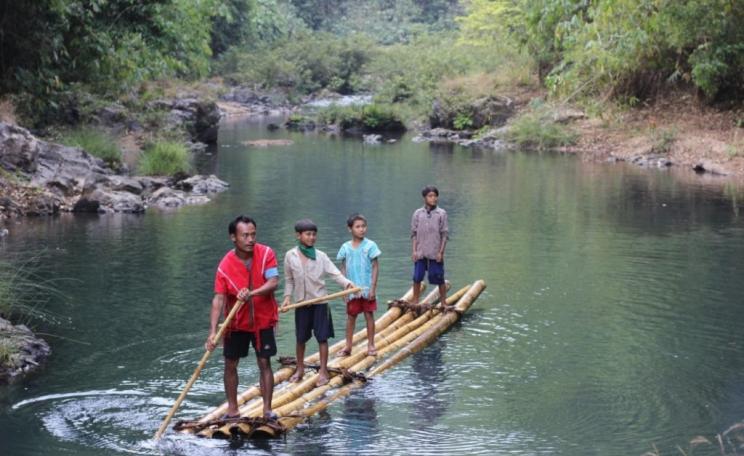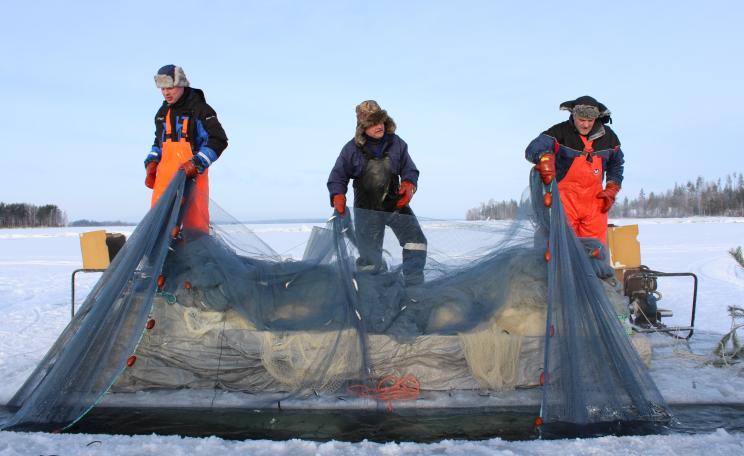Tiny bubbles of methane trapped in lake ice
Methane emissions from lakes and rivers are a significant factor in the greenhouse gas cycle, claims a new study which urges climate scientists and policy-makers to pay it closer attention.
The 'other' greenhouse gas, as it is sometimes known, is regularly left out of the public discourse on climate change - one usually dominated by discussions of carbon dioxide (CO2). It makes up a small portion of the atmosphere in comparison to CO2 but is 20-30 times more potent in its ability to absorb infrared energy and contribute to the global warming effect.
As well as natural sources like wetlands and lakes, methane is also emitted from industrial sources and agriculture (rice fields and livestock).
Scientists from Sweden, Brazil and the US investigated methane emissions from 474 freshwater systems and explained their 'previously neglected' role in recycling the carbon absorbed by the land. The natural landscape absorbs carbon dioxide but decaying trees, vegetation and plant matter in water systems then produce significant amounts of methane and CO2 emissions.
'Our accounting system is focussed solely on land and trees but the landscape is bigger than that and we should be taking account of the role freshwater systems play in the greenhouse gas cycle,' said lead study author David Bastviken from Lopatking University, Sweden.
The study estimated total emissions of methane from freshwater systems to be 103 million tonnes per year - the equivalent to 25 per cent of all the carbon dioxide absorbed by the world's land areas.
However, Bastviken dismissed suggestions that climate engineering solutions could be used to negate methane emissions from lakes and rivers . 'It seems much better to focus our efforts on reducing fossil fuel emissions which are the main problem. Large scale ecosystem engineering would be shifting the attention away from the real problem and is dangerous and not very cost-effective in this case,' he said.
 |
| Diagram showing the role of lakes in recycling carbon absorbed by the land |
Useful links
Study: Freshwater methane emissions offset the continental carbon sink
| READ MORE... | |
 |
NEWS Draining paddy fields could cut methane from rice production Chinese scientists have discovered that draining rice paddies just once every growing season may help reduce global methane emissions from the industry by almost a third |
 |
NEWS ANALYSIS Methane: the quick fix for global warming? Its short lifespan and greater potency means tackling methane emissions now could have a dramatic effect on atmospheric greenhouse gas concentrations |
 |
INVESTIGATION Peak phosphorus: our most important nutrient running out It has no synthetic alternative and some scientists believe supplies may already be in a terminal decline. But there is still no international effort to tackle the massive agricultural problems that will come when the phosphorus runs out |
 |
NEWS ANALYSIS What's stopping us getting solar power from deserts? Plans to use concentrating solar power plants in the Sahara to generate and export electricity have been on the table for years. Now, it looks as though political will might help move things forward |
 |
NEWS ANALYSIS How deep-sea mining could destroy the 'cradle of life on earth' As Papua New Guinea gives go-ahead to a Canadian mining company to dredge its coastal seabed for minerals, critics say environmental assessments have been inadequate, local objections ignored and new species of life could be extinct before they have even been discovered |








